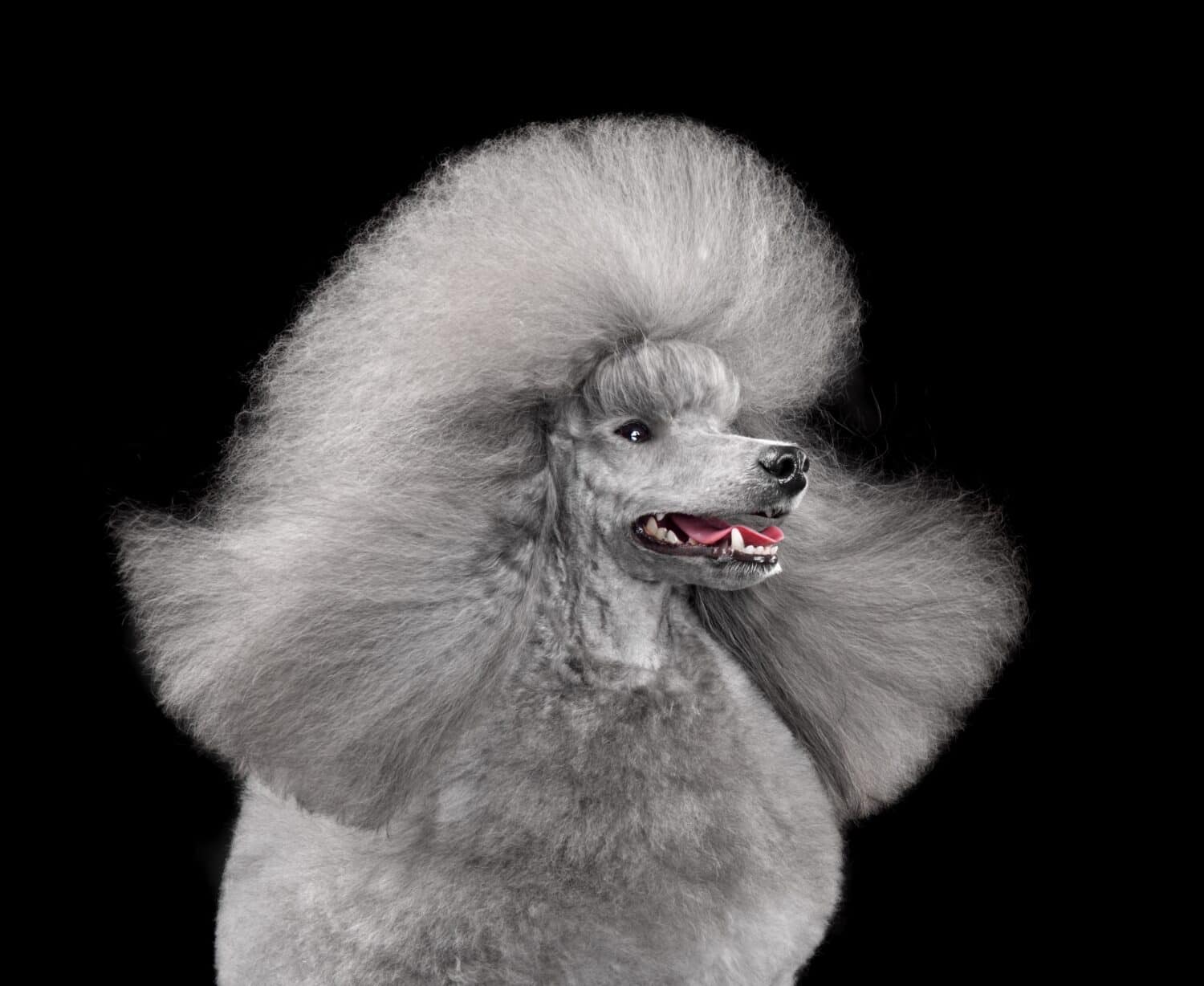If you’ve decided to welcome a Poodle into your home, there are a few things you need to know. Some breeds may be mellow, happy to have some walks here and there and chill on the couch. The Poodle is not one of these types of dogs. They require a large amount of engagement and stimulation. They’re not a breed that is happy to be left alone in the yard for the day. Plus, they need obedience training to be at their best. Here is what to know about how to train your poodle.
History of the Poodle
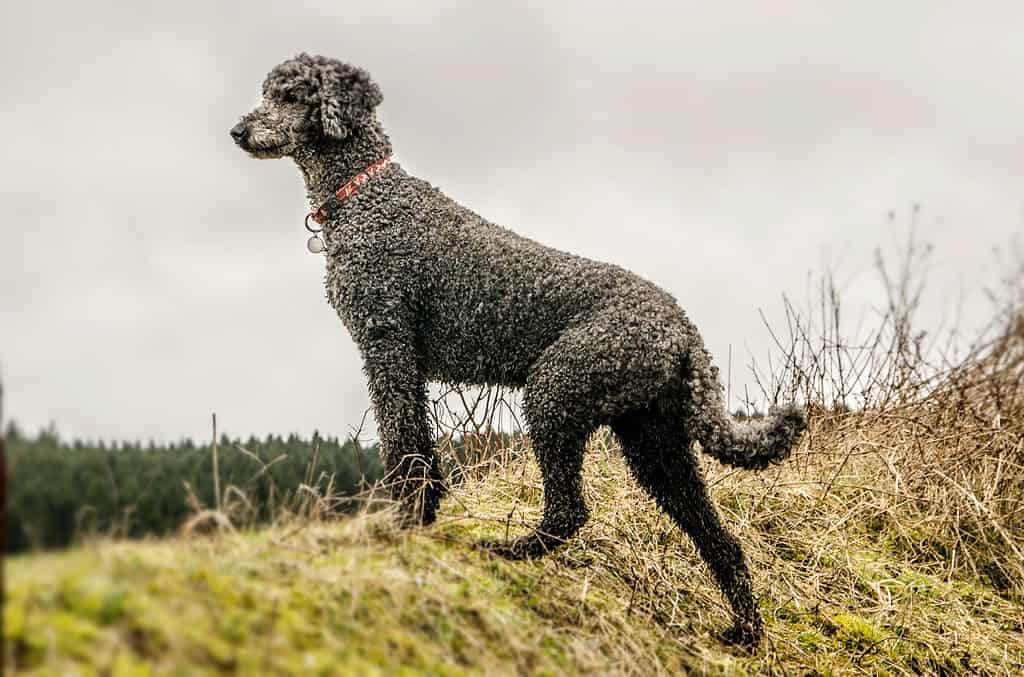
Poodles love having a job.
©OneToRemember/iStock via Getty Images
Poodles may be the national dog of France, but they originate in Germany. Their name comes from the German word “pudel”, which translates to “splashing in the water”. Despite being part of the American Kennel Club’s non-sporting group, the breed is more than a pretty face with nice hair. They were originally used to retrieve waterfowl for hunters, and that fancy cut serves a purpose. It kept the dog’s joints and organs warm while swimming.
Poodles come in three sizes: toy, miniature, and standard. But all sizes of Poodles have some commonalities. The breed is known for its intelligence and trainability. All Poodles must be groomed regularly since they have hair that will continue to grow rather than fur that falls out. The temperament of a Poodle is usually friendly, fun-loving, and playful. They typically love to learn and be involved. But there are some common challenges for the breed. If not properly trained, they can exhibit anxiety, reactivity, and stubbornness.
Poodle Training Challenges
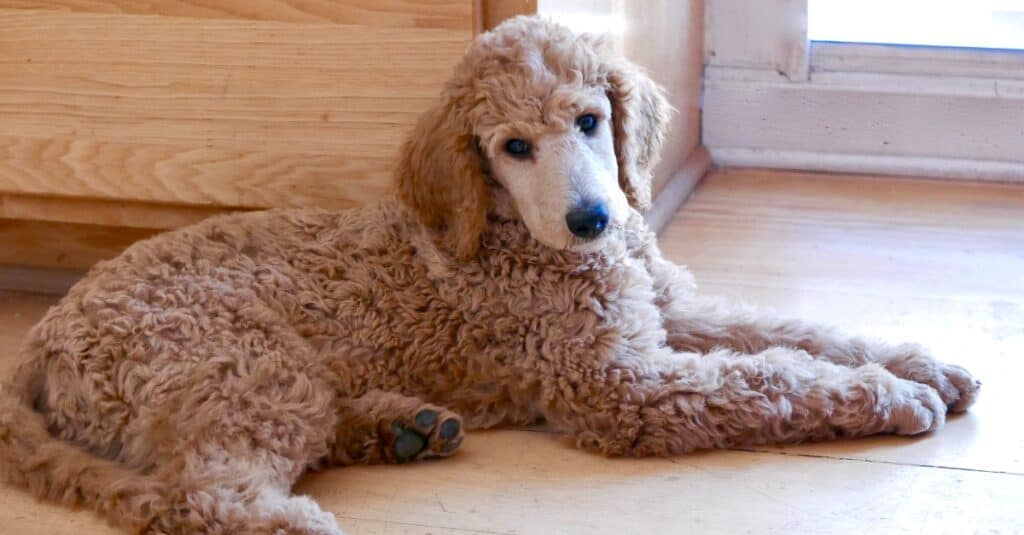
Poodles are high-energy and need mental stimulation.
©iStock.com/Laura Fay
Due to their high energy and intelligence, Poodles need a lot of mental stimulation on top of physical activity. If they aren’t properly challenged, Poodles may misbehave to get that energy out instead. This may show up as excessive barking, jumping on people, or even nipping. That’s why it’s a good idea to start training your Poodle as soon as they enter your life.
Tips For Training a Poodle
It’s smart for all dog breeds to learn some basic training when you bring them home. Getting on a potty training schedule is first and foremost of importance. You’ll want to keep your pup on a general routine of eating, playing, and sleeping, with potty breaks after each of these stages. This will help your dog learn when bathroom time is coming and avoid accidents in the house. Additionally, it’s worth spending some training time on the following areas when you have a Poodle.
1. Basic Commands

Poodles need proper training to be at their best.
©AntonMaltsev/Shutterstock.com
Your Poodle should learn the basics of obedience. For example, sit and stay are important for teaching impulse control. Especially since some Poodles may tend to jump, knowing these commands sets them up for success when they are meeting new people and dogs. “Leave it” teaches your dog to focus on you instead of an object. And “drop it” teaches them to let go of something in their mouths, usually in exchange for something they are allowed to have.
How to teach sit: There are a few methods, but one way is to hold a treat in front of your dog’s nose. Slowly lift the food above their head, encouraging them to look up and naturally move into a sitting position. Give them the treat at the moment their bottom touches the ground. Eventually, you can move from a treat to just the motion with your hand, to using the actual word “sit” along with your hand.
How to teach stay: Once your dog knows how to sit, you can teach them to stay. Encourage them to stay in one spot while sitting. Keep giving your dog treats the longer they stay in one spot. In time, create more of a distance between your dog and yourself. Eventually, you can teach “okay” or “release” to get them to come to you for a treat.
2. Crate Training

A crate is like a den for your dog.
©Lim Tiaw Leong/Shutterstock.com
Being comfortable in a crate is an important skill for dogs to have. After all, there may come a time in their lives when they have to be boarded, travel, or stay at the veterinarian. Crate training can also keep your dog out of trouble and out of danger if you have to leave them alone for some time.
How to crate train: Start by feeding your Poodle meals in their crate with the door open to get them used to it and associate it with good things. Eventually, you can start to shut the door for longer amounts of time while they are in the crate eating, until they feel comfortable. Then gradually prolong their time with the door shut with you out of sight. Be patient and never punish your dog if they are uncomfortable with the crate, as the process can take weeks for some dogs.
3. Recall
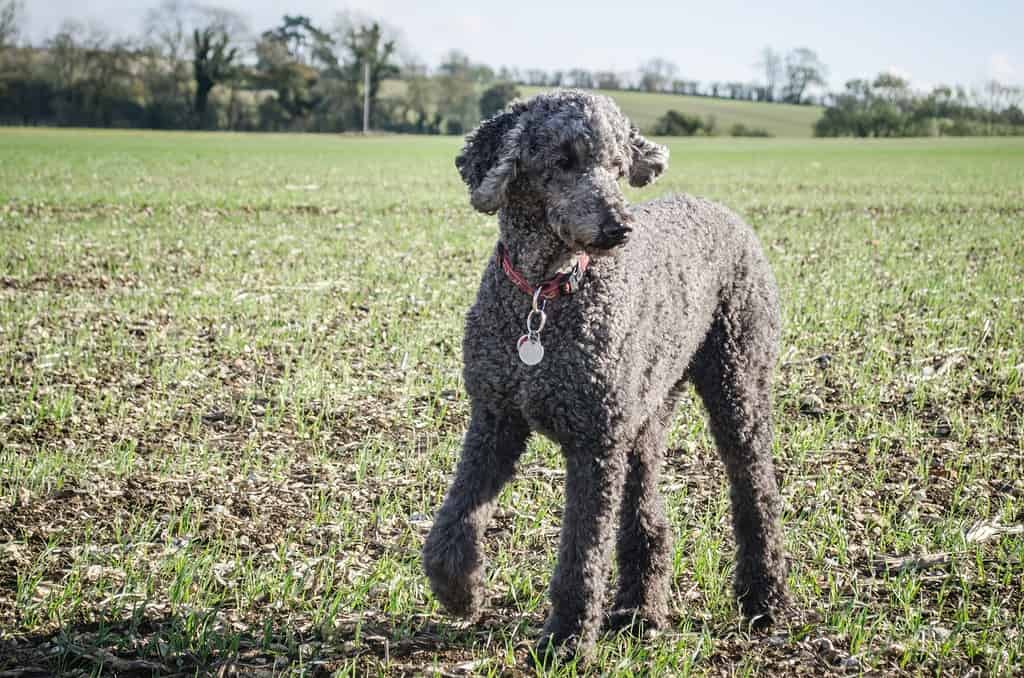
Teaching recall is important because it can help you get your dog to come back in an emergency.
©iStock.com/OneToRemember
Because of their intellect, Poodles tend to have a mind of their own. They might ignore you when you call them to come to you unless there’s something in it for them! Teaching recall can keep your poodle safe if they are in a situation where they may be in danger if they run off.
How to teach recall: First, get a long line, which is just an extra long leash. Using a long line while your pup is learning recall gives you control to safely stop them if need be. Call them back to you, and give them a treat when they respond. If they try to run off, step on the long line so they can’t go further. Never yank the dog towards you, but rather use the long line to stop them where they are.
4. Grooming
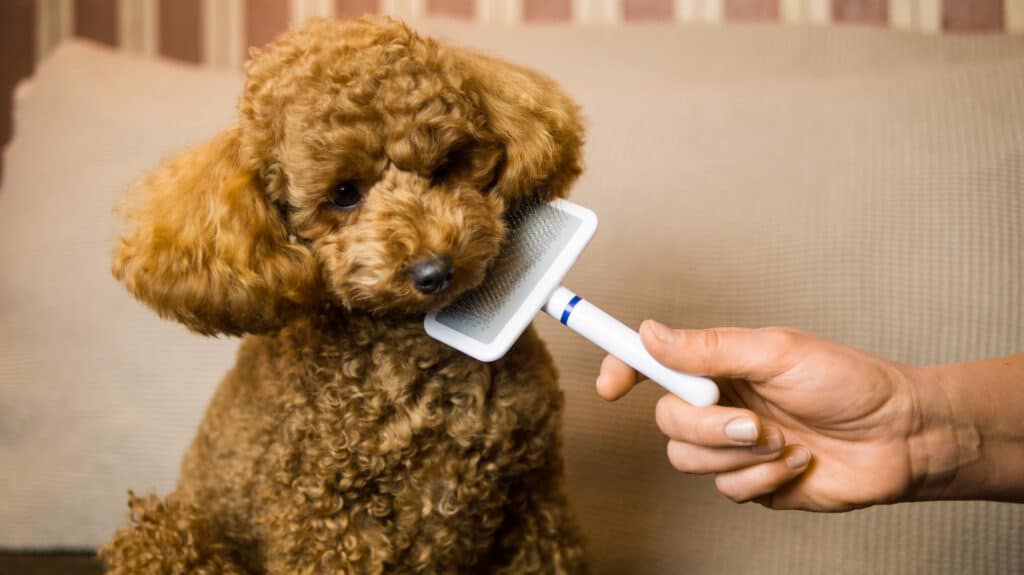
Get your poodle used to being brushed as soon as they come home.
©Kristina Arba/Shutterstock.com
Poodles will have to be groomed regularly throughout their lives due to their growing hair. If you don’t groom regularly, it can cause mats and knots that pull on the skin and leave the dog uncomfortable and in pain. Poodles should start getting used to being groomed from the time they are around 10 weeks old.
How to get a Poodle used to grooming: Grooming can be scary, between the loud noises of hairdryers, clippers, and buzzers. That’s why your puppy should make regular visits to a groomer as soon as you bring them home, so they grow up used to it. But it’s also important for them to be comfortable with you maintaining them at home. Make grooming a fun and calming activity. While offering them treats or toys, gently touch their paws, ears, and tail. Offer rewards as you brush them and let them sniff the various tools for grooming. Take it slow and make grooming a relaxing experience.
5. Mental Games
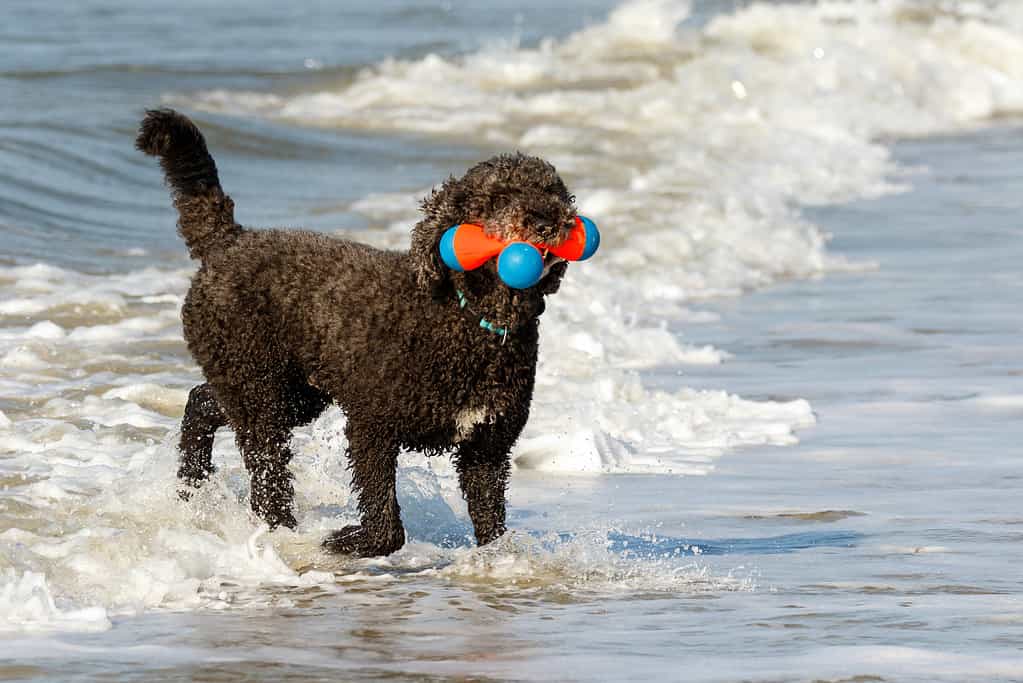
Poodles love playing games with their owners.
©Richard McGuirk/iStock via Getty Images
Poodles love to use their brains. Mental challenges are as important for this breed as physical exercise. But you don’t have to buy all the treat puzzles in the world. Games can be done at home with things you already own.
How to incorporate mental games: Try lining up a row of plastic cups, with a treat hidden under one of them. Watch as your Poodle sniffs around, trying to find the one with the treat. Keep reconfiguring the cups in different ways. It’s also fun to throw treats in the grass and encourage your Poodle to sniff around and find them.
Your Poodle is likely to enjoy training classes to learn new things, such as obedience, circus tricks, or nose work, where they are taught to use their sense of smell to find certain items. And if there isn’t a good class near you, there are many training books on the market.
Mistakes Not To Make When Training a Poodle

Poodles are sensitive dogs who don’t respond well to harsh training methods.
©iStock.com/Jovan Baturan
Poodles are a sensitive, intuitive breed. They don’t respond well to harsh punishment. Yelling at, reprimanding, or hitting a Poodle if they make a mistake will only cause them to shut down and shut you out. The best method for training a Poodle is positive reinforcement. Reward your pup with treats, praise, or a favorite toy when they demonstrate the behavior you are teaching. The reward must come immediately after the dog does the behavior so they learn what they are being rewarded for.
Another mistake to avoid with your Poodle is not following through when you ask something of them. Poodles will learn fast what they can and can’t get away with. Be consistent with training, and you’ll be rewarded for years to come with a well-behaved buddy.
Ready to discover the top 10 cutest dog breeds in the entire world?
How about the fastest dogs, the largest dogs and those that are -- quite frankly -- just the kindest dogs on the planet? Each day, AZ Animals sends out lists just like this to our thousands of email subscribers. And the best part? It's FREE. Join today by entering your email below.
Thank you for reading! Have some feedback for us? Contact the AZ Animals editorial team.

